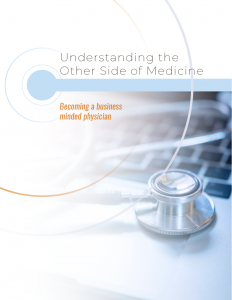The Importance of Being Educated: Why Physician Financial Literacy is Crucial to Professional and Personal Wellness as a Physician
Physicians are, without a doubt, some of the most educated professionals around. You spend endless hours studying, taking tests, and jumping through academic hoops in the name of science, good grades, and patient care. But is the education you are receiving truly preparing you for the practice of medicine today? Healthcare is now considered almost exclusively a business term (1) …..and none of the pneumonic and study tools you learned covered even the basis of the business of medicine. Learning the language of the healthcare industry is a crucial skill for the physicians of today and tomorrow.
The Elephant in the Exam Room
According the Cambridge Dictionary, Financial Literacy is the ability to understand the basic principles of business and finance. (2) This definition seems simple enough, yet the grasping the nuances of the business of medicine is as challenging as learning the intricacies of a rare disease. Despite numerous scholarly articles and professional organizations acknowledging this reality, there is little that is offered in the form of business education during medical training. Medical schools teach time old traditions of gathering information and performing an excellent physical exam; many are now teaching procedural skills such as ultrasound and various phlebotomy techniques. But the elephant of financial literacy is still standing in the middle of the room, thus leaving residents overwhelmed when facing this new reality as they near graduation. It’s like asking an intern to perform a comprehensive visit on a complex patient in a 15-minute patient slot on July 1st…..not only is it near impossible, it’s just plain cruel. But there is hope: leaders in medical education are starting to not only recognize the need for but recommend that educators teach their learners “non-clinical skills” that are vital for success after graduation into the “real world” of medicine.
Getting some Guidance
In response to the quickly evolving machine of the healthcare industry, the Accreditation Council for Graduate Medical Education (ACGME) has incorporated several recommendations for educating residents in all specialties on the business of medicine. The Common Program Requirements, core metrics that each residency program, regardless of specialty, have to meet have distinct requisites incorporating topics such as health systems management, quality improvement, systems-based practices. (3) Graduate medical educators and residency programs are now held accountable for providing their learners the scaffolding to build an understanding of the healthcare industry…. but is it enough? Teaching residents how to develop a quality project and be mindful of the cost of treatment recommendations are unquestionably necessary skills for physicians in training to develop. However, while learning the basics of healthcare finance is absolutely vital for residents to navigate this industry post-graduation, many residents are starting behind the proverbial eight ball when it comes to a baseline knowledge of personal finances. (4)
Ignorance is Not Bliss
As noted above, the majority of residents in training have a startlingly low level of personal financial literacy. Despite having an enormous amount of personal educational at the end of medical school, many residents have been shown to have “low financial literacy and investment-risk tolerance, high debt, and deficits in their financial preparedness.” (4) So how did we wind up here? According to Christie Ton, DO, an American Academy of Family Physicians (AAFP) Emerging Leaders Institute (ELI) Project Winner, there is an unmet educational need for teaching medical students, let alone residents, the basics of financial literacy. (5) Although many skills are required to become a competent physician, being adept at finances is not one of them. Biology, chemistry, and a mastery of a multitude of science courses are needed to do well on the MCATs; medical schools are finally, and appropriately so, recognizing the importance of good communication skills in their applicants. But again, the elephant stomping through the room is the profound lack of basic financial education necessary, let alone required, for entrance into medical school. Add this to years of being isolated from the “real world” by grueling hours of studying, bedside training, and duty hours with peers having the same insulating experience, and you’ve created a major driver of the physician Burnout.
Getting Educated
Just like the first day of medical school, developing a savviness for the ins and outs of business in medicine, both professional and personal, can seem overwhelming. There are a multitude of new terms, concepts, and acronyms (yes, they’re in this field too) that can look like a jumbled mess too unwieldly to untangle. However, you already have the tools you need to tackle this seemingly impossible task. By taking a moment to step back, use your analytical skills, and embrace your fear of the unknown, you’ll soon see that this task is something you can master. Here are a few tips that I’m pretty sure you already use on an everyday basis that you can now apply to your financial education:
- Know the Lingo. Remember trying to figure out what the heck EC ASA stood for? How about ORIF? Or CABG? Or, my all-time favorite medical term: All the acronyms, slang, and really big words were overwhelming. Feeling under-versed can take an already anxiety provoking subject (money) and make it overwhelming. So, familiarize yourself with the terms used in business, both at home and in the office.
- Know your Resources. Nothing strikes fear into the heat of a physician than an encounter that starts with “well doc, I Googled my symptoms….” Search engines are powerful tools, however, without careful, defined search parameters, the results can take a seemingly innocent question and turn out results that strike fear into the heart of the most reasonable person. Organizations such as the American Medical Association, the Institute for Healthcare Improvement, and Harvard Business Review provide reliable, vetted information in a variety of formats. You wouldn’t devise a complex treatment plan based on an unreliable source…. why do the same with your, or your businesses’, finances?
- Get an Insider’s Perspective. As noted above, you are likely insulated from the “real world” with peers who are experiencing the same struggles as you are. However, you and your colleagues are not the first medical trainees who have faced this challenge. As the old saying goes, there are no stupid questions, only the ones that go unasked. Ask your peers what they are doing to educate themselves. Look to those who have not only survived but thrived through this storm. Resources such as whitecoatinvestor.com (6) and drpiggybank.org (7) are not only informative, they are tangible evidence that physicians can educate themselves on the intricacies of finance.
Why It Matters
I was lucky enough to be Dr. Ton’s advisor in her ELI project. We spent quite a bit of time bouncing this idea around and discussing the ins and outs of how to conduct this project. She very simply and powerfully stated that basic financial literacy is not a requirement to be a competent physician, and we are literally shooting ourselves in the foot by missing the proverbial forest through the trees. By hyper-focusing all our attention on science, standardized test prep, and nailing the details of medical facts, we lose sight of the financial sacrifice we’ve made and the impact it has on our financial, let alone emotional health. Lack of professional and personal financial literacy is a primary driver of Burnout, which we all are very well acquainted with. By taking the time to be informed, ask uncomfortable questions, and broaden our education beyond the traditional art of medicine, you are giving yourself a much-needed booster of professional and personal financial literacy to help prevent the onset of Burnout.
To read more on Understanding The Other Side of Medicine by author Kyle J. Anderson in the Career and Life Planning Guidebook for Medical Residents, follow this link: Understand the Other Side of Medicine
References:
- Sawyer, Nick T. “In the U.S. “Healthcare” Is Now Strictly a Business Term.” The western journal of emergency medicine vol. 19,3 (2018): 494-495. doi:10.5811/westjem.2018.1.37540
- https://dictionary.cambridge.org/us/dictionary/english/financial-literacy
- https://www.acgme.org/What-We-Do/Accreditation/Common-Program-Requirements/articleid/4703
- Ahmad, Fahd A., et al. “An Assessment of Residents’ and Fellows’ Personal Finance Literacy: an Unmet Medical Education Need.” International Journal of Medical Education, vol. 8, 2017, pp. 192–204., doi:10.5116/ijme.5918.ad11.
- Piggy Bank: Improving Physician Financial Literacy Early; Christie Ton, DO Phelps Hospital Family Medicine Residency Program; 2018 Family Medicine Leads Emerging Leader Institute Scholar & Leadership Project Award Recipient
- https://www.whitecoatinvestor.com/
- https://www.drpiggybank.org/
About Author: Dr. Megan Vermeulen is the Director of Content Strategies at physiciancareerplanning.com and Associate Program Director at Rowan University SOM Family Medicine Residency Program.









